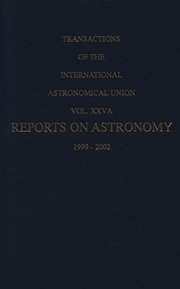No CrossRef data available.
Article contents
Commission 46: The Teaching of Astronomy
Published online by Cambridge University Press: 25 April 2016
Extract
Education is important to astronomers because it affects the recruitment and training of future astronomers, and because it affects the awareness, understanding, and appreciation of astronomy by taxpayers and politicians.
There are many other reasons why astronomy should be part of education and culture. Astronomy is deeply rooted in the history of almost every society, as a result of its practical applications and its philosophical implications. It still has everyday applications to calendars and timekeeping, navigation, seasons and climate. It has longer-term applications to climate change and biological extinctions. Astronomy advances the other sciences, and is a dynamic science in its own right. It deals with our place in time and space, our cosmic roots, and our kinship with other peoples and species on earth. It reveals a universe which is vast, varied, and beautiful, and it promotes curiosity, imagination, and a sense of shared exploration and discovery. It provides an enjoyable hobby for millions of people. In a school context, it provides an alternative approach to the scientific method - the observational (as opposed to experimental) approach. It can attract young people to study science and technology. It can promote rational thinking, and it can increase public interest in science and technology. These benefits are important in all countries, both developed and developing.
- Type
- Commissions of the Executive Committee
- Information
- Copyright
- Copyright © Kluwer 1997


